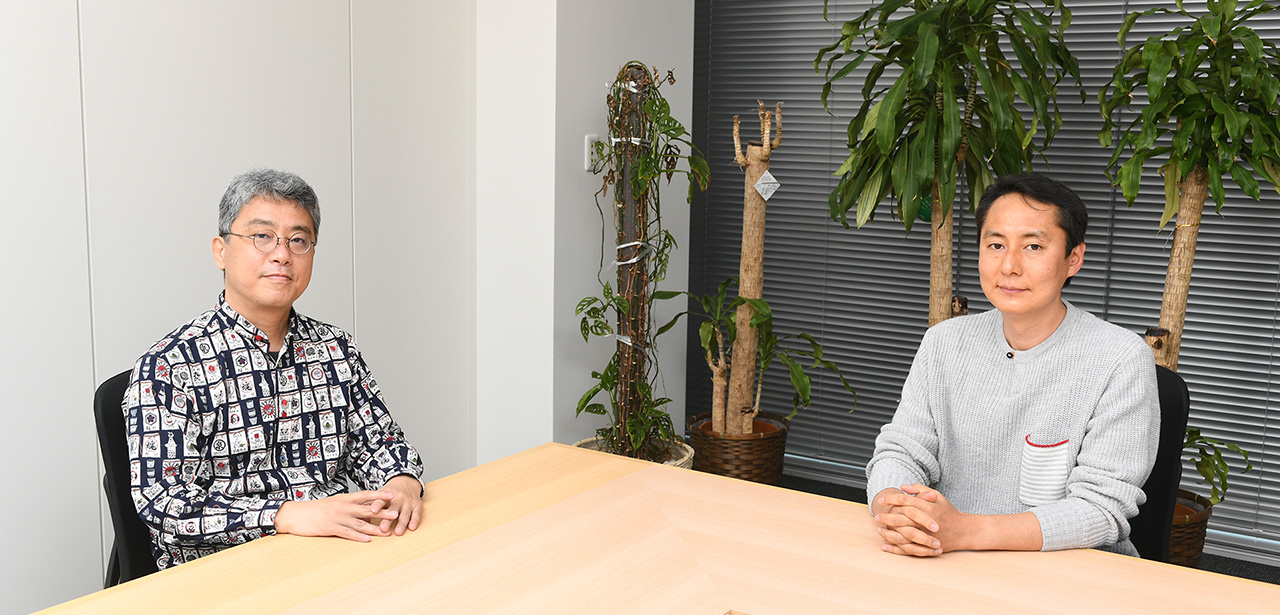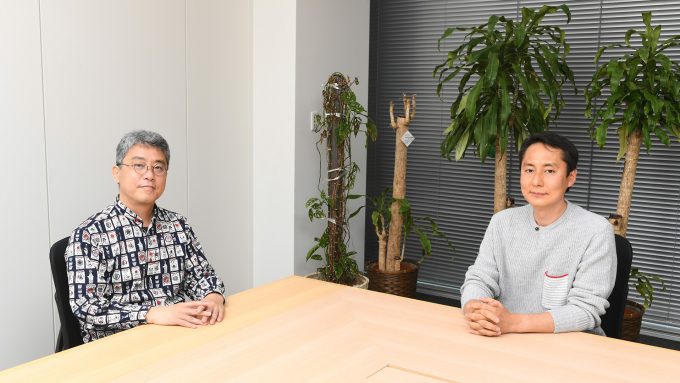“WE DISCUSS VANA’DIEL” is a series of conversations between Producer Matsui and special guests who are familiar with FINAL FANTASY XI (FFXI). Our eleventh guest is Yoshitada Iwata, who has been closely involved in Ragnarok Online (RO), an MMORPG which, like FFXI, is celebrating its 20th anniversary in 2022. In this second part, Producer Matsui and Mr. Iwata shared how the other MMO seemed from their perspective.
General Manager of Operations, Development Division, GungHo Online Entertainment, Inc. He joined the company as a GM in 2002, when RO was launched in Japan. In addition to leading the GM team, he was also involved in the development and operations of other MMORPGs, such as Emil Chronicle Online and Grandia Online. Since 2010, he has been overseeing numerous titles within the company as Executive General Manager.
 Ragnarok Online is an online game for PC developed by Korean game development company Gravity, available all over the world since August 2002 (since December 2002 in Japan). Cutely deformed 2-dimensional characters and the 3-dimensional world are the game features.
Ragnarok Online is an online game for PC developed by Korean game development company Gravity, available all over the world since August 2002 (since December 2002 in Japan). Cutely deformed 2-dimensional characters and the 3-dimensional world are the game features.
FFXI was on a whole different level
RO and FFXI both officially launched in 2002. At what point did the two of you grow aware of each other's titles?
- Matsui
At the time, Square was determined to make FFXI the first MMORPG for consoles, and the entire company was involved in its development. Given that, I was all the more surprised when RO emerged in 2002, the same year as FFXI, even if it was for PC. RO's cute art style also seemed very approachable for many gamers, so I've been aware of the game since launch.
What about you, Mr. Iwata?
- Iwata
Having grown up with FF and DRAGON QUEST, I knew about FFXI ever since it was announced. My first impression, as I recall, was being surprised that a numbered title in the FF series was going to be exclusively online, and at such an early timing to boot.
Moreover, when the official launch came and I tried it out, the game was high-quality in just about every sense of the word. (laughs wryly) At the time, to be honest, I considered FFXI not as a rival in the MMORPG industry, but rather a game that was on a whole different level. - Matsui
Thank you, we're very honored to hear those words. Many of our development staff are spirited in their craft and tend to pursue the utmost quality in everything they make. However, that also came with its downsides, and there were many occasions where even I felt, “We don’t need to go THAT far...” I’d suggest something like, "How about we go easy on texture density to speed up the pace of development?" which would be met with, "Why on earth would you have us compromise quality?" and it was a difficult balancing act.
Perhaps knowing that they were working on the latest numbered title in the FF series further heightened their emphasis on quality.
- Matsui
I think that might've been part of it. However, when developing an MMORPG, it's important to find a balance with other aspects like network features, so being adamant about high quality isn’t always the right way to go. Our team, including myself, was unfamiliar with that sort of unique mindset that was required in online game development, so we were learning as we went.
- Iwata
I see.
- Matsui
That said, FFXI continues to compete at the forefront of the industry two decades later, which we owe to the staff back then and their relentless pursuit of quality. As such, I remain grateful to our staff members from those days, as well as Mr. Tanaka*, who brought them together.
* Hiromichi Tanaka, original Producer of FFXI.
The reason behind FFXI’s emphasis on cooperative play
Have you played FFXI yourself, Mr. Iwata?
- Iwata
I played when the Windows version was released. We had a staff member in our company who played FFXI, and they told me, “Tarutaru white mages are super popular in parties,” so I took their advice and made one. However, there weren't many opportunities for me to join a party and white mage wasn't really suited for solo play, so I had a really rough time. (laughs wryly)
What was your impression of the systems and other aspects of the game?
- Iwata
What impressed me the most when I played was how the majority of activities, even leveling up, was designed to be done with parties. This was because RO, on the other hand, was designed so that you could still enjoy a lot of the game solo, and although there was content requiring parties, it was basically offered as just another way to enjoy the game.
There certainly weren't many MMORPGs that treated cooperative play as a mandatory feature, even back then.
- Iwata
In spite of that, FFXI turned out to be a shining example of the strategic depth involved in forming well-rounded parties to defeat powerful enemies. What was the intention behind FFXI's emphasis on party play to begin with?
- Matsui
That was influenced by EverQuest*, which was our team’s first experience with MMORPGs and the very game that inspired FFXI’s development. The thrill of EverQuest comes from cooperating with characters of different roles to take on foes of a superior league. The FFXI project was proposed precisely because we found that concept enjoyable, so it was inevitable for our game to place importance on cooperative play.
* EverQuest is a massively multiplayer online role-playing game (MMORPG) released in North America in 1999. Online games already had other obstacles in terms of approachability. Were you ever concerned that emphasis on cooperative play might deter even more players?
- Matsui
That’s certainly something we had in mind. During development, we were always thinking about how we could make cooperative play enjoyable for the greater audience. For example, Mr. Iwata mentioned white mage earlier, which we’d originally conceptualized as a job that could still fight using melee attacks when playing solo. But since white mages could heal themselves, they had no need to join a party. During the beta test, we saw feedback that white mage players were declining invites even if parties needed them, so we hastily made balance adjustments.
Mr. Iwata, what would you have thought if someone had proposed content for RO that emphasized party play?
- Iwata
Hmm... This is strictly speaking about RO, but had we started to make a strong push towards party play, I believe it would've incited a backlash from players. Even I would've probably felt that it wasn't quite right.
So you're saying FFXI and RO had taken different directions in that regard.
- Iwata
Personally, I think MMORPGs are sort of like theme parks, which provide a virtual space where everyone can choose from a range of activities to play. For instance, RO is primarily a solo-oriented game, but it still has content for parties and guilds. And I believe this is also the case for FFXI, but there are other activities to enjoy, such as chatting with friends or making a profit through vending (bazaars). That range in playstyles is one of the biggest charms of MMORPGs.
I see.
- Iwata
But I'm not talking about whether RO and FFXI are right or wrong. There's no denying that FFXI and its focus on cooperative play has been well-received by many players. Also, it’s truly wonderful how FFXI has managed to convey to their players that playing together with friends is the best part of online games. After all, that’s a very difficult concept to convey.
- Matsui
Thank you for advocating on our behalf. (laughs)
- Iwata
So although RO and FFXI are both part of the MMORPG genre, I believe they have completely different realms of enjoyment. I viewed our titles not as direct competitors who aim to poach players from each other, but as healthy rivals and fellow comrades in the sense that we're both doing our best to keep the MMORPG industry exciting.
- Matsui
I feel the same way. Of course, as a game developer, I do feel competitive when I hear RO is doing well, so I am aware of them as rivals in that sense.
Different hurdles for RO and FFXI
FFXI was only available on the PlayStation 2 (PS2) at launch, while RO began as a Windows PC title from the start. Do you have any thoughts on any other differences between the two games that came about as a result?
- Iwata
You might say that RO's low barrier to entry is a strength that FFXI didn't have. Back in the early days of the Broadband Age, PCs were starting to become a one-per-household commodity. That meant anyone who wanted to play RO already had an environment equipped for playing, and there were few other MMORPGs for us to compete with.
Whereas playing FFXI at launch came with a lot of hurdles, especially since the PS2 didn’t come with a feature to connect to the internet.
- Matsui
As you say, there were a lot of obstacles, like having to purchase the PlayStation BB Unit separately. Moreover, the status quo was for games to be purchased as physical discs and played alone. I was just another development staff member at the time, but I believe the higher-ups in our company were quite determined to change this mindset.
It's precisely because FFXI challenged uncharted territory that they were able to lead the way as the first full-fledged MMORPG for consoles.
- Matsui
Yes, I think so too.
On the other hand, RO was developed by a company overseas, which must've provided a different challenge compared to FFXI, which was developed in-house. Were there any difficulties you faced in that regard?
- Iwata
Updating RO involved putting in a request with the development company and waiting for what seemed like ages, localizing what they made into Japanese, then finally getting around to implementation. It always took such a long time, and each time I’d feel apologetic to our players for having them wait for so long.
- Matsui
As a fellow developer, I was curious about how often the development company would listen to your requests.
- Iwata
At launch, our requests were only met with half-hearted responses. GungHo's internal management also wasn't in place yet, so we had our hands full with just localizing the Korean update content for the Japanese audience. But simply maintaining that sort of service wouldn’t allow us to satisfy any itches or implement content aimed at Japanese players. Coming up with a way to rectify that situation was a major topic for us in the early days of service.
What did you end up doing?
- Iwata
We thought, "If the development company won't work on it, we'll do what we can." We didn't even have GM tools back then, but we analyzed in-game scripts and verified them on a test server, and after keeping that up for a while, we were able to implement simple in-game events on our own.
- Matsui
In other words, you reverse-engineered it.
- Iwata
Yes. We showed our accomplishments to the development companies and steadily conveyed the kinds of requests we received from Japanese players and what kind of updates were needed. By repeating this process, we improved our relationship with the development company. The developers gradually began to recognize us as partners, and started asking us questions, such as how certain updates were received by Japanese players, or what could be done to improve the game's reception in Japan.




